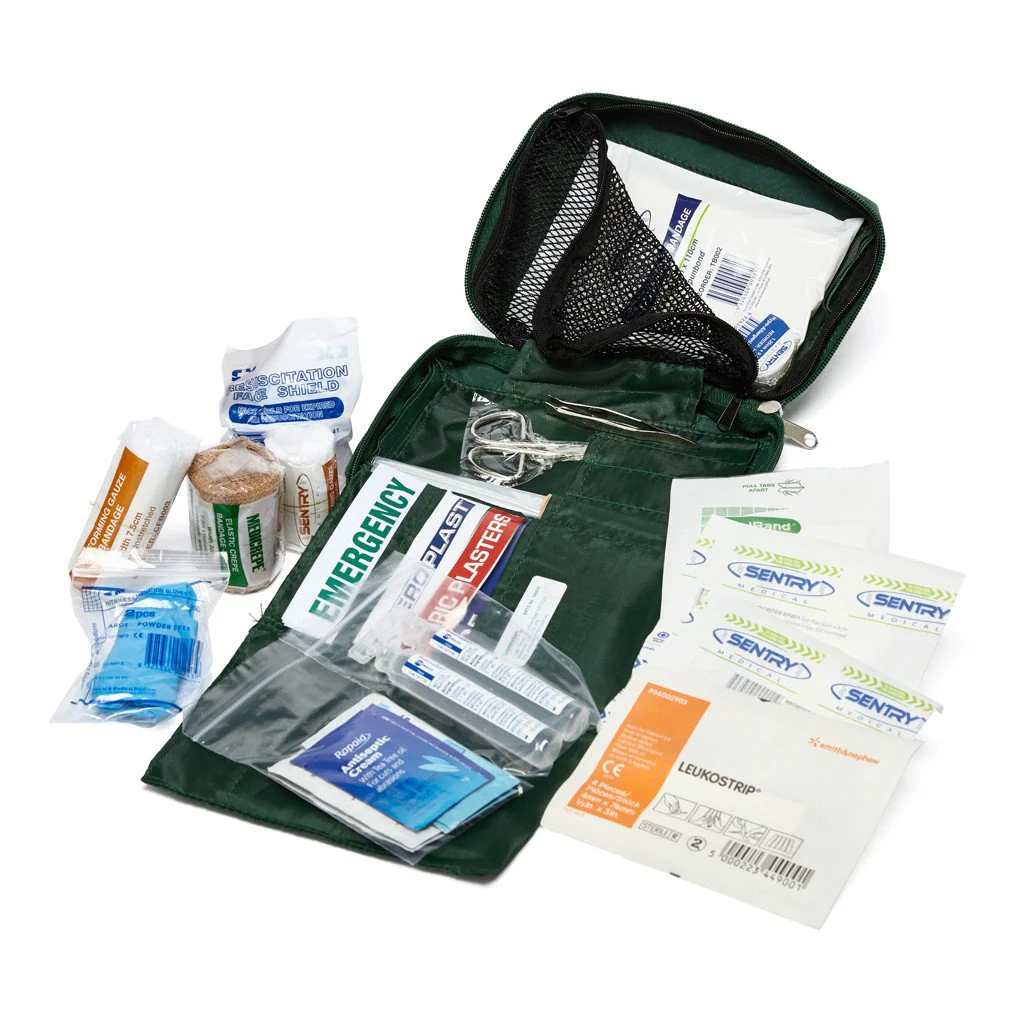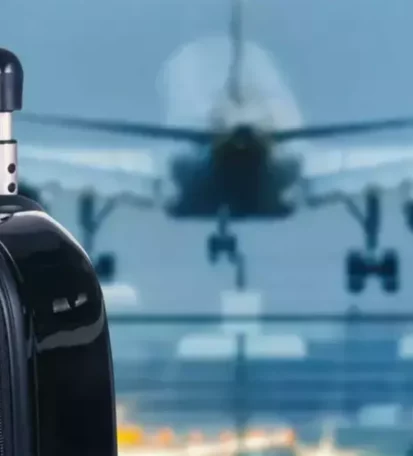Tips
The Ultimate Business Traveler First Aid Kit: What You Need to Stay Prepared on the Go

Business travel can present unexpected challenges, and being prepared is crucial. A well-assembled business traveler first aid kit is essential for addressing common health issues on the go. From minor injuries to potential illnesses, having the right supplies can provide peace of mind and allow for a smoother trip.
Choosing what to include in a first aid kit can seem overwhelming. Travelers should focus on essential items that cater specifically to their itineraries and personal needs, ensuring they are ready for a variety of situations. Customization is key, as different destinations may pose unique health risks or require specific treatments.
Knowing basic first aid can significantly enhance the value of having a first aid kit. It empowers travelers to effectively use their supplies in emergencies, leading to quicker responses that could make a difference in critical situations.
Key Takeaways
- A first aid kit is vital for managing health emergencies while traveling for business.
- Customizing the kit for specific destinations enhances preparedness.
- Basic first aid knowledge is essential for maximizing the kit’s effectiveness.
Why a First Aid Kit Is Essential for Business Travelers
Business travelers face unique challenges during their business trips. The unpredictability of travel—such as delayed flights or sudden changes in schedule—can lead to unexpected health issues. A well-stocked first aid kit can address minor injuries or ailments that might arise.
Key Reasons for a First Aid Kit:
- Immediate Attention: A first aid kit allows quick response to minor emergencies, preventing small issues from escalating.
- Remote Locations: Many business trips involve visits to remote areas where medical facilities may not be easily accessible.
Must-Have Items in a Business Travelers First Aid Kit:
- Adhesive bandages
- Antiseptic wipes
- Pain relievers
- Allergy medication
- Motion sickness tablets
Having these supplies readily available in a business traveler first aid kit can provide peace of mind and contribute to a smoother business trip. Being prepared means less stress and better focus on important meetings and events.
Preparation enhances professional image. A traveler showing responsibility by carrying a first aid kit reflects diligence and readiness. They are equipped to handle any situation, ensuring that health-related issues do not disrupt business objectives.
What to Include in Your Business Travel First Aid Kit
A well-equipped business traveler first aid kit can make a significant difference during business travel. Key components to include cater to common ailments, injuries, and health maintenance.
Over-the-Counter Medications
Over-the-counter medications are essential for immediate relief from common issues. Including items such as acetaminophen or ibuprofen helps address pain and fever. Antihistamines are useful for allergies, while decongestants can relieve congestion.
It is important to consider digestive aids as well, such as antacids for heartburn and loperamide for diarrhea. If traveling to areas where motion sickness is a concern, adding motion sickness tablets can be beneficial. Keep all medication in labeled containers to avoid confusion during travel.
Wound Care Supplies
Wound care supplies are vital in managing minor injuries. A variety of adhesive bandages in different sizes should be included for cuts and scrapes. Sterile gauze pads and adhesive tape can assist with larger wounds.
Antibiotic ointment is crucial to prevent infections when treating minor cuts. It is also wise to pack antiseptic wipes for cleaning wounds before applying dressings.
In addition, consider including a couple of triangular bandages for slings or larger injuries.
Essential Tools and Equipment
Essential tools and equipment enhance the effectiveness of a business traveler first aid kit. A pair of scissors can cut tape or clothing when necessary. Tweezers are useful for removing splinters or other foreign objects from wounds.
Including a digital thermometer helps monitor fever. Adjusting to different contexts, a reusable ice pack can reduce swelling and ease pain.
A CPR face shield can also be an essential item for emergencies that require resuscitation.
Personal Health Essentials
Personal health essentials cater to the unique needs of each traveler. Prescribed medications should be packed for any ongoing health conditions, ensuring an adequate supply for the trip.
It is also wise to include a spare pair of glasses or contact lenses if needed.
Sunscreen and insect repellent are crucial for outdoor business events. Additionally, packing hand sanitizer and disinfectant wipes can help maintain hygiene during travel.
Finally, any particular medical supplies specific to personal needs should be accounted for to ensure preparedness.
Customizing Your First Aid Kit for Different Destinations
When preparing a business traveler first aid kit, specific considerations for different destinations ensure comprehensive safety. Factors like climate, common ailments, and local risks must guide the selection of items.
Traveling to Tropical Locations
Tropical destinations often present unique health risks, such as insect bites and waterborne diseases. Including items to manage these specific challenges is crucial.
Essential items for a tropical first aid kit include:
- Insect repellent: A strong repellent can prevent bites that may transmit diseases like Zika or dengue fever.
- Antihistamines: These help alleviate allergic reactions from bites and stings.
- Antidiarrheal medication: Essential for travelers who may experience stomach issues due to different food and water sources.
Additionally, ensure to include sunscreen to protect against sunburn and a hydrating electrolyte solution to aid recovery from heat-related illnesses. Most top corporate travel management companies can also provide you with a best fitting checklist.
Traveling to Cold Climates
Cold environments can inflict specific injuries or illnesses such as frostbite and hypothermia. Preparing for these risks involves careful selection of items.
Key components for a cold climate first aid kit might include:
- Thermal blankets: Useful for retaining body heat in emergencies.
- Cold compresses: Effective for treating minor injuries related to falls on ice.
- Moisturizing lotion: Protects skin from harsh, dry conditions that can cause cracking or chapping.
It’s also wise to include extra layers or hand warmers, particularly for extended outdoor activities.
International Travel Considerations
International travel introduces varying healthcare standards and potential language barriers. Customizing the kit for different destinations should reflect these differences.
Crucial items for international travelers include:
- Travel insurance documentation: Ensures quick access to medical care when needed.
- Prescription medications: Carry an adequate supply and keep copies of prescriptions.
- Medical phrasebook or app: Helpful for communicating health concerns in non-English speaking regions.
Understanding local medical facilities and emergency numbers can aid effective responses in a foreign environment.
Tips for Organizing Your First Aid Kit
Selecting the right container is crucial. The container should be durable and spacious enough to hold all essential items. Consider a portable option for easy transport.
Categorize supplies by their purpose. Group items like bandages, antiseptics, and medications together. This makes it easier to find what is needed quickly.
Include a list of contents. A checklist ensures that nothing is left out. It helps in verifying supplies after usage.
Incorporate an emergency contact card. This card should include numbers for local emergency services and poison control. It provides immediate access to critical information.
Add a first-aid guide. A small booklet with basic instructions is valuable. It can assist anyone unfamiliar with first aid procedures.
Regularly check expiration dates. Items like medications and antiseptics may expire. Routine checks ensure that everything remains effective and ready for use.
Store the kit in a known location. Keep it in a place where it can be easily accessed during emergencies. A well-placed kit can save time and reduce stress.
Finally, consider personal needs. Customize the kit to address specific health concerns or conditions. For instance, include personal medications or items for allergies.
The Importance of Knowing Basic First Aid
Knowing basic first aid is essential for any business traveler. Emergencies can happen at any time, and having the skills to respond effectively can be crucial.
A few key points highlight its importance:
- Safety: First aid knowledge can help ensure personal and team safety during emergencies.
- Prompt Response: Quick action can minimize the severity of injuries until professional help arrives.
- Confidence: Being prepared boosts confidence when traveling.
Essential first aid skills include:
- Wound Care: Understanding how to clean and dress wounds can prevent infections.
- CPR: Knowing CPR can save lives in cardiac emergencies.
- Choking Relief: Being able to assist someone choking can be the difference between life and death.
It is beneficial for business travelers to participate in first aid training. Organizations like the Red Cross offer valuable resources. Proficiency in first aid allows travelers to handle minor health issues effectively and provides peace of mind.
By integrating first aid knowledge into travel planning, individuals increase their preparedness for unexpected situations. This proactive approach can lead to safer and more successful business trips.
Safety Tips for Business Travelers
Maintaining health and safety while traveling for business requires attention to hydration, stress management, and food safety. Implementing specific strategies can enhance well-being during trips and reduce health risks.
Staying Hydrated and Well-Rested
Business travelers must prioritize hydration and sleep to maintain their energy levels and focus. Dehydration can lead to fatigue, affecting productivity. It is essential to drink water regularly throughout the day, especially during flights.
A practical approach is to carry a reusable water bottle to ensure access to water at all times. Travelers should also consider limiting caffeine and alcohol, as these can contribute to dehydration.
Rest is equally vital. Scheduling time for adequate sleep helps the body recover and function effectively. Business travelers should aim for a consistent sleep schedule, even when dealing with different time zones.
Managing Stress on the Road
Travel often comes with stress, which can impact both physical and mental health. To mitigate stress, travelers should incorporate relaxation techniques into their routine. Deep breathing exercises or short meditation sessions can be effective tools for maintaining calm.
Establishing a work-life balance during travel is crucial. Setting specific work hours and devoting time to leisure activities, like walking or reading, helps reduce burnout.
Staying connected with family and friends through regular check-ins can also provide emotional support, making travel less isolating.
Avoiding Food and Water Contamination
Food and water safety are critical for avoiding gastrointestinal issues during travel. Business travelers should be cautious when eating in unfamiliar places. Opting for established restaurants with good hygiene ratings can reduce the risk of foodborne illnesses.
When it comes to water, drinking bottled or purified water is advisable, especially in areas where tap water quality is questionable. It’s also wise to avoid ice made from tap water.
Travelers should familiarize themselves with local food safety practices and common dishes to steer clear of any potential health risks. Stringent food safety measures can make a significant difference in the overall travel experience.
Digital Tools to Complement Your First Aid Kit
In today’s tech-driven world, many digital tools can enhance a traveler’s first aid preparedness. These tools provide immediate access to medical information and assistance.
Essential Digital Tools:
- Health Apps: Applications like MyTherapy or Medisafe help track medications and remind users to take them on time.
- Emergency Apps: Apps such as Red Cross First Aid offer step-by-step guides for handling various medical emergencies. They provide critical knowledge that can make a difference.
- Telemedicine Services: Platforms like Teladoc allow users to consult with healthcare professionals remotely. This can be crucial when traveling in areas with limited access to medical facilities.
- Digital Thermometers: Smart thermometers can connect to smartphones. They allow users to monitor body temperature over time, aiding in the detection of fever.
- Wearable Devices: Smartwatches can monitor heart rate and even detect falls. This data can be shared with medical professionals in emergencies.
Investing in these digital tools not only complements a traditional first aid kit but also empowers travelers to manage health issues more effectively. In unfamiliar territories, this technology serves as a valuable resource for maintaining health and safety.
Conclusion
A well-prepared first aid kit can make a significant difference for business travelers. It allows them to address health issues promptly while away from home.
Key items to include are:
- Adhesive bandages for cuts and scrapes
- Antiseptic wipes to prevent infection
- Pain relievers for headaches or discomfort
- Allergy medication for unexpected reactions
- Cold packs for minor injuries
Each item serves a specific purpose, ensuring travelers are ready for various situations. Having these essentials readily available can alleviate stress during a trip.
Travelers should periodically review the contents of their first aid kits. This ensures all supplies are within their use-by dates and adequately stocked. Personalizing the kit based on individual health needs is also crucial.
By investing time in preparing a business traveler first aid kit, professionals can enhance their travel experiences. They remain equipped to handle minor emergencies effectively, allowing them to focus on their work commitments.
FAQs
Many business travelers have specific queries regarding the essentials of a first aid kit. The following questions address key considerations such as size, TSA compliance, recommended kits, and the necessity for additional supplies during international travel.
What should be the size of a business travel first aid kit?
The size of a business travel first aid kit should be compact yet comprehensive enough to address common medical issues. Typically, a small kit that fits easily in a briefcase or laptop bag is ideal. It should contain the basic supplies without taking up excessive space.
How do I ensure my first aid kit complies with TSA regulations for carry-on luggage?
To comply with TSA regulations, a first aid kit should contain only essential medications and supplies. Liquids, such as antiseptic solutions, must be in containers of 3.4 ounces or less. It’s advisable to keep the kit organized and easily accessible during security checks.
Can you recommend a compact first aid kit suitable for carrying in a business travel briefcase or laptop bag?
A compact first aid kit such as the Adventure Medical Kits Mountain Series is suitable for business travelers. This kit is lightweight and includes essential items like band-aids, antiseptic wipes, and pain relievers. It is designed for easy storage in a briefcase or laptop bag.
Are there specific first aid items that should be included for international business travel to remote locations?
For international travel, especially to remote areas, items such as anti-diarrheal medication, altitude sickness tablets, and a wider range of bandages are important. Additionally, travelers should consider including medications for specific illnesses prevalent in the destination region.
How often should I check and replenish supplies in a business travel first aid kit?
It is advisable to check and replenish supplies in a first aid kit every six months. This ensures that all medications are within their expiration dates and that essential items are restocked after use. Regular checks help maintain preparedness for unexpected medical needs.




